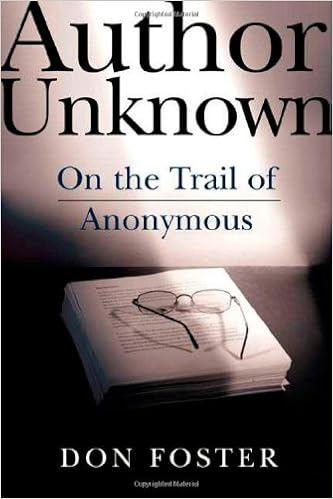I've long been skeptical of using textual analysis to attribute text to a given author. The results, I would say, are always bound to be inconclusive--at most, one can say that authorship is "probable," unless the author him- or herself comes forward an admits being the writer (and even then, sometimes, there are questions). Foster's book almost makes of me a believer in the technique. In case after case, his conclusions apparently bear out. Sort of.
The first case study, on Foster's first foray into this field, is on a poem called "A Funeral Elegy," which Foster attributed to Shakespeare. He raises a lot of good reasons for why one should believe such. He also recounts the academic politics that keep his observations from being wholly accepted (the account of which--all the egos and one upmanship--reminds me so much of why I didn't want to stick around to earn a doctorate over a decade ago; arguments like "This can't be Shakespeare because it's not brilliant enough" hardly seem logical to me, but coming from big names seem to be acceptable). But Foster too may have been a victim of his own desire to assign the poem to an important writer. He sets out to "find the author," though in his mind the author very well might be Shakespeare. Wanting it to be so, he argues it is such. Years later, apparently, after this book was written, another author comes forward and proves, perhaps a bit more conclusively, that the author was more likely one John Ford. I give Foster credit for, after reviewing the evidence, apparently changing his own views--truth, for him, it seems, is more important than his own reputation. But the case goes to my anxiousness about textual analysis and attribution--unless Shakespeare or Ford can come forward and say who is the author, we really cannot know. We can only surmise, only say it's probable.
In the second case Foster follows, the one that would bring him to popular knowledge, the author does just that. Foster shows that Joe Klein is the likely author of the novel Primary Colors, the fictionalized account of a presidential campaign eerily similar to Bill Clinton's own. Klein denied, of course, for a full year, before finally saying, Yeah, twas me. What was interesting in this chapter was to hear Foster's own angst expounded, the way in which Klein's denial in effect hurt Foster's own standing in academe.
The rest of book is also a great read, covering four more literary mysteries, in which Foster holds out his own conclusions until far into a given chapter, making readers read on and on, turning pages as if they were reading some sort of potboiler. STOP reading here if you don't want spoilers!
Foster covers the case of the Unabomber (for which defense lawyers tried to hire him--he eventually did some work for the prosecutors). He covers the Talking Points mentioned in the Starr Report, finding the likely author to be both Lewinsky and various lawyers (the chapter mostly just reminded me of the disgust I felt in the 1990s at the behavior of President Clinton and at the Republican Congress and Starr himself who seemed bent on looking for anything, anything at all, that would allow them to impeach Clinton, that they strayed far, oh so far, from the original special prosecution mandate). He covers Wanda the bag lady, whose letters some attributed to Thomas Pynchon (the real author, Foster contends, was an mostly unsuccessful Beat poet who tragically killed his wife and himself at about the same time Pynchon moved from California). His final chapter looks for the author of "Twas the Night before Christmas" and makes a convincing case that Clement Clarke Moore more or less stole the attribution from a Dutch doggerel poet named Henry Livingston.
Sunday, December 7, 2008
Subscribe to:
Post Comments (Atom)







No comments:
Post a Comment